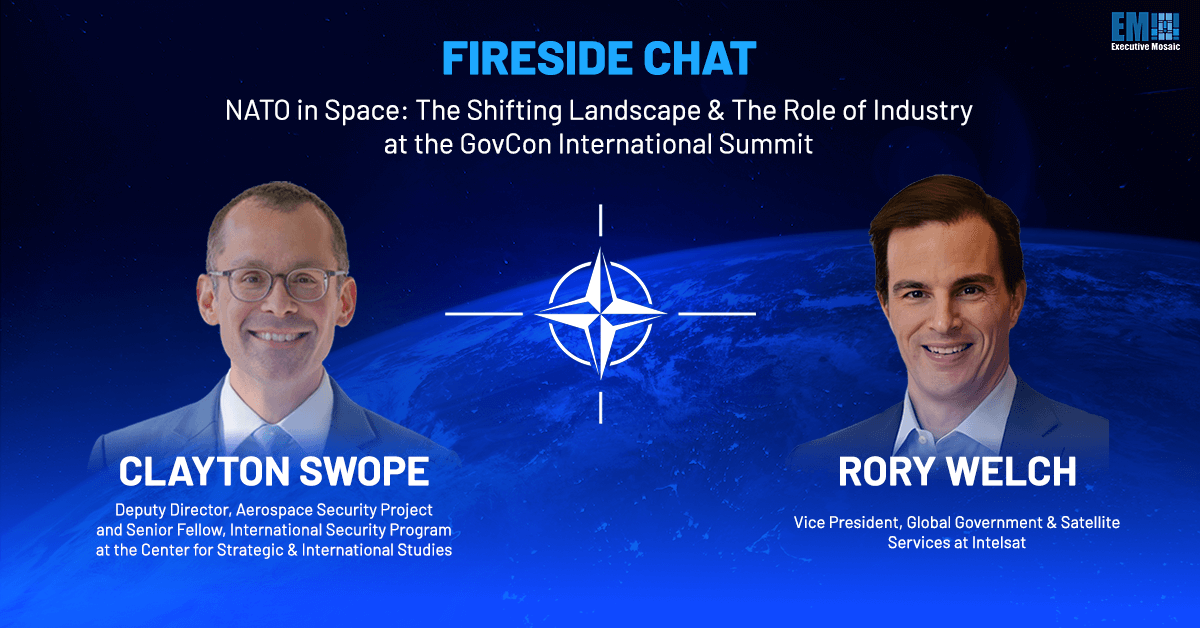The North Atlantic Treaty Organization, a.k.a. NATO, the post-World War II alliance between the U.S. and 31 other nations, has been steadily honing its focus on the space domain over the last decade or so. Its first piece of policy on space came in 2012, though it was another seven years until the organization followed it up with its next legislative measure in the field, as well as established space as an operational domain. 2020 brought the Space Center at Allied Air Command—a central place through which space information flows between nations—and 2023 saw the standing up of the NATO Space Center of Excellence, based in Toulouse, France.
According to Clayton Swope, senior fellow in the International Security Program at the Center for Strategic and International Studies, there is cause for grave concern in the potential for Russia and other adversaries to wipe out U.S. satellite capabilities, thus leaving the country without key military navigation and communication.
Swope will discuss these issues in a riveting fireside chat with Intelsat’s Rory Welch at the Potomac Officers Club’s 2024 GovCon International Summit on Oct. 10. Their conversation will be a highlight of the event — be sure to take part.
Why Space Is a Contested Domain
“Too much is at stake to assume that China or Russia, when the question could be victory or defeat, would not risk their own access to and use of space to cripple many of our most critical national security and defense capabilities — rendering us vulnerable in the event of an armed conflict,” Swope wrote for CNN.

He notes that the U.S. has not participated in armed conflict sans satellite communications since the Korean War in the 1950s. The country and the Department of Defense specifically have become hugely reliant on these systems.
Swope suggests that the U.S. should start by rethinking its overriding reliance on satellite technology and “learn or relearn backup methods and integrate those backups into military operations.” The CSIS official also says the U.S. should figure out how to fight without these capabilities or at least wage war with them in a degraded state.
According to Swope, only three nations have the capacity to monopolize and truly dictate power in the space domain: the U.S., Russia and China. It stands to reason, then, that the U.S. ought to band together with NATO allies to accomplish Swope’s “two-pronged” solution: “Double down on efforts to protect and maintain access to space in a hostile space environment and consider how to operate without space.”
Who Is Clayton Swope?

There isn’t a better person to speak about space, intelligence and international security than Clayton Swope. The impressive executive began his career at the CIA, where he served for nearly 15 years as a technical intelligence officer in the Directorate of Science and Technology. Subsequently, he was a policy advisor on foreign policy, trade, defense and civil space, intelligence, cybersecurity, veterans, homeland, technology, federal workforce and labor, and tax issues in the House of Representatives. Prior to his current role at CSIS, Swope worked for Amazon’s Project Kuiper, a low Earth orbit satellite venture, wherein he headed up matters of national security and cybersecurity public policy. He came to his position at the Center for Strategic and International Studies in November 2023.
Who Is Rory Welch?
Swope’s fabulous conversation partner during the GovCon International Summit fireside chat is Rory Welch, an experienced government, military and private sector satellite expert. Welch is a two-decade U.S. Air Force veteran with deployment time in Iraq and fluency in satellite operations, intelligence, surveillance and reconnaissance systems, space launch and more. He was principal deputy director of mission operations at the National Reconnaissance Office and for the last decade has lent his wealth of knowledge to Intelsat, where he began as director of space services and business development.
In his current position as vice president of global government and satellite services at Intelsat, Welch fulfills customized satellite needs for defense, intelligence and civil space clientele across the globe. He additionally plays a significant role in spacecraft design and early orbit support for various satellite network organizers and producers.

What the Fireside Chat Will Unlock
Swope and Welch are prepared to engage in a fruitful dialogue about what NATO should and can do in the current space race, with China and Russia looming large, and how private industry can aid in this quest for dominance by America and its allies. There will be opportunities to ask the speakers questions and to engage with them directly, so be sure to check out the full lineup for the GovCon International Summit and join this unparalleled all-day networking experience.




